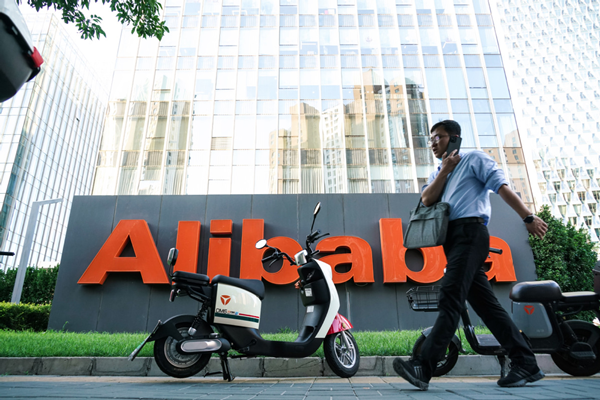Alibaba revenue beats expectations

A pedestrian walks past the headquarters of Alibaba in Beijing. [Photo by KUANG DA/FOR CHINA DAILY]
Despite the challenges posed by the COVID-19 resurgence, Chinese tech heavyweight Alibaba Group Holding Ltd delivered better-than-expected financial results in the April-June period, saying it is determined to continuously invest in technology, customer service and logistics operations for sustainable and long-term growth.
The company's total revenue stood at 205.56 billion yuan ($30.4 billion) for the quarter ending June 30, down 1 percent year-on-year compared with 205.74 billion yuan a year ago, beating analysts' expectations. Its adjusted net income fell 30 percent on a yearly basis to 30.25 billion yuan.
"During the past quarter, we actively adapted to changes in the macro environment and remained focused on our long-term strategy by continuing to strengthen our capabilities for customer value creation," said Daniel Zhang, chairman and CEO of Alibaba Group.
Following a relatively slow April and May, the company saw signs of recovery in June along with the resumption of supply chains, logistics and delivery capacities, and registered positive growth during the June 18 online shopping carnival, Zhang said in an earnings call with investors on Thursday night, adding the trend of consumption recovery continued in July.
"What we have seen in China's retail marketplace is an overall strong and positive sentiment from merchants to take full advantage of our marketplaces and available digital tools to drive their business growth, especially during difficult times," Zhang noted.
Zhang highlighted that the company is confident in its growth opportunities in the long term given its high-quality consumer base and the resilience of its diversified business model.
Toby Xu, chief financial officer of Alibaba, said the company will continue to focus on "cost optimization and cost control" in the coming quarters. Xu said Alibaba is trying to find a balance between controlling costs and continuing to make "important investments" in technology and other core areas to build its capacities for long-term growth.
During the June quarter, gross merchandise volume-a measure of the transactions of goods-from Alibaba's core e-commerce business, which refers to its Taobao and Tmall platforms, experienced a mid-single-digit percentage decline year-on-year mainly due to a COVID-19 resurgence that resulted in supply chain and logistics disruptions in April and most of May.
Pan Helin, co-director of the Digital Economy and Financial Innovation Research Center at Zhejiang University's International Business School, said Alibaba should further diversify its business layout by providing differentiated services targeting existing varied consumer groups, and utilize cutting-edge digital technologies to bolster the digital transformation of traditional industries amid mounting competition from domestic rivals.
Cloud computing revenue, its main growth driver besides e-commerce, rose 10 percent to 17.69 billion yuan, reflecting a recovery in overall non-internet industries driven by financial services, public services and telecommunications industries.
"In the long run, Alibaba has shown strong resilience to challenge and pressure in leveraging underlying internet technologies to upgrade its own business scenarios," said Chen Duan, director of the Digital Economy Integration Innovation Development Center at the Central University of Finance and Economics, while emphasizing the company's cloud business is expected to be a key growth engine and pivot apart from its core e-commerce unit.
Noting that cloud computing has been increasingly applied in the e-commerce segment to help enterprises enhance operational efficiency, Chen said more efforts should be made to make full use of the advantages of Alibaba Cloud in technology and products to empower the digitalization of more micro, small and medium-sized enterprises and drive the industrial upgrade.
